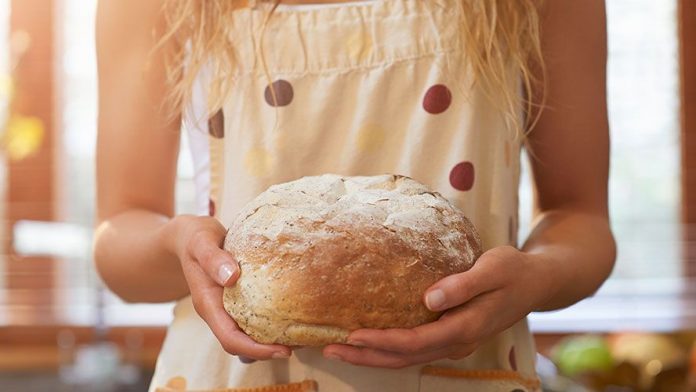Here’s what to eat for breakfast — beyond scrambled eggs.
Want to start the day with momentum? Nourish your body with foods that will power you up. It’s true that no meal is superior to another, but eating a nutrient-dense breakfast can do wonders for your mind and body.
Whether you already eat it every day or rarely make time for breakfast, transforming the first meal of your day into one that is filled with key vitamins and minerals will help you break through the potential brain fog that’s typically brought on by low blood sugar. One study suggests that individuals who have irregular breakfast consumption habits are more likely to develop metabolism problems. Not only that, breakfast eaters are more likely to have lower serum cholesterol levels, keeping their hearts in good shape. If you’re a part of the “I’m not hungry in the morning” crew, and you want to get into the habit of eating a healthy breakfast, start small and use the trial-and-error method to find foods that you can tolerate that make you feel your absolute best.
What does a balanced breakfast look like?
Primarily, you’re gunning for a trio of protein, fiber-packed carbohydrates and better-for-you fats — but feel free to add in as many veggies and fruit to the equation as you’d like. Avoid subbing protein or fiber-rich carbs for more fat, or vice versa; you need all three to truly get your day started right.
Regardless of what your pantry looks like right now, follow these nutritionist-approved guidelines to make breakfast more enjoyable and fuel-filled:
Watch for added sugar: Your favorite breakfast may taste savory, but sugar tends to silently hide out in things like granola, oatmeal, bagels, cereals and bars, as well as coffee, tea and juice. Reach for unsweetened products if you can (including non-dairy milk for your cup of morning joe) and keep sugar counts as far below 10g per item as possible.
Power up on produce: Breakfast salads are in! Add leftover veggies or fresh greens to eggs or whatever else is on your morning plate. The added punch of fiber can help you feel fuller (and more satisfied) for longer.
Lean on lean protein: Bacon is tasty but is best in keen moderation. Choose lean cuts of fish and poultry, beans, legumes, unsweetened dairy products (like yogurt!) and eggs rather than processed deli meats.
Not sure where to begin? Add these tasty ingredients to build a nutrient-dense breakfast that will give you long-lasting energy.
Whole Grains
Whole grains contain antioxidants that protect your tissues from harmful inflammation. Plus, they’re loaded with minerals like calcium, potassium, magnesium, zinc and iron — important building blocks for a strong immune system and healthy heart. The B vitamins found in whole grains also help your body convert food into energy.
You can choose anything from quinoa to farro, buckwheat groats to millet as a base layer of a breakfast bowl and layer it with savory ingredients (eggs! nuts! lox!) or sweet additions (almond milk! honey!). And, yes, bread can be part of a balanced breakfast: Select a 100% whole-grain or 100% whole-wheat loaf.
Protein Shakes
Protein shakes aren’t just a quick method for stocking up on protein. “They’re also a great way to get in veggies with breakfast,” says Amy Fischer, M.S., R.D., C.D.N., a registered dietitian with the Good Housekeeping Institute. In addition to protein powder, she adds two big handfuls of spinach, unsweetened nut milk, high-fiber fruits like berries and a dash of cinnamon to her shakes. When choosing a protein powder, Fischer recommends looking for one that’s a complete protein (meaning it contains all nine essential amino acids) and is verified by a third party (which ensures an outside company has performed quality-control testing). If you see words like organic, grass-fed, wild or non-GMO on the label, that’s a good sign, too. “Overall, the fewer ingredients the better,” says Fischer. “Avoid added sweeteners, fillers and stabilizers.”
Bananas
Bananas help you fill up and come in their own portable packaging. Their folate and vitamin B6 aid in the production of serotonin, which can help improve mood and reduce anxiety. The soluble fiber also helps lower cholesterol by removing it from your GI tract and preventing it from moving into your bloodstream (i.e., clogging your arteries). And, if you are up early for a workout, the electrolytes potassium and magnesium found in bananas will help you recover quickly. For an extra heart-healthy kick, slice bananas on top of morning oats with a tablespoon of chia seeds or walnuts.
Prunes
Prunes are underrated, but they are impressively high in nutrients making them a great addition to breakfast. They are naturally sweet and contain vitamins and minerals that work together to protect the bones, including fiber, vitamin K, magnesium, potassium, boron, copper and polyphenols. One study suggests eating five to six prunes each day may help to support bone health across the lifespan, especially for postmenopausal women at risk for bone fractures. There are so many ways to enjoy prunes: Try adding chopped prunes as a topping to oatmeal, yogurt or a morning smoothie.
Eggs
There are many reasons why eggs are a classic breakfast staple. Full of vitamins A, D and B12, they’re an inexpensive and nutrient-dense food. Two large eggs also contain more than 50% of the choline you need each day, and just one egg has about 8 grams of protein as well. Nearly everything in our bodies requires protein to function properly, including our skin, blood, muscles and bones. Protein also takes longer to digest than carbs so you feel fuller for a longer amount of time. And GH Nutritionist-Approved Eggland’s Best Cage-Free Eggs have six times more vitamin D and 10 times more vitamin E compared to ordinary eggs. For a breakfast that’s full of fiber and lean protein, try making scrambled eggs on whole-grain toast with sliced tomato or a spinach-broccoli-mushroom omelet.
Berries
Recent studies suggest berries have beneficial roles in many functions of the body like supporting immune function and the gastrointestinal system. A cup of strawberries has 3 grams of fiber and all of your day’s vitamin C needs. The antioxidants found in berries (including blueberries, blackberries and raspberries) also have cell-protecting properties. Eating more of them can help protect your blood vessels from harmful plaque and boost circulation. If berries aren’t at the top of your list, citrus fruit, apples, stone fruit and melon are all great alternatives. They’re filled with potassium to help balance blood pressure and mitigate uncomfortable bloat.
Seeds
Sesame, chia, sunflower, pumpkin, flax — the list of great-for-you seeds goes on. Add them to cereal, smoothies (or plain water), puddings and baked goods. A single 1.5 ounce serving of chia seeds can contain about 7 grams of protein. On top of that you’ll find minerals like zinc, magnesium, iron and calcium to support your overall health.
Seeds also contain soluble fiber that can help lower your “bad” cholesterol (LDL) while increasing “good” cholesterol (HDL). The combination of protein and fiber can also prevent a blood sugar spike (and subsequent crash) before lunch.
Oats
Oats are one of the best breakfast foods for a number of reasons. As a 100% whole grain, they’re filled with fiber, plant-based protein, B-vitamins and minerals including iron, calcium and magnesium. Eating whole oats has been linked to a reduced risk of heart disease thanks to a type of fiber known as “beta-glucan” which research shows to improve cholesterol levels. This type of plant fiber called a “prebiotic” feeds your body’s probiotics, helping friendly bacteria in your digestive system to survive and thrive. Not sure which ones to pick? We like GH Nutritionist-Approved McCann’s Steel Cut Oats.
Avocados
These fruits have a unique mix of heart-healthy fats, water and dietary fiber. That combo enhances feelings of fullness, making you less likely to overeat throughout the rest of the day. The unsaturated fats in avocados are also linked to a decreased risk of heart disease, lifestyle-related cancers and diabetes. So go ahead and eat that avocado toast on whole-wheat bread — it packs in B vitamins and minerals from both avocado and whole grains. (Bonus points if you put an egg on it for extra protein!)
Nuts and Nut Butter
What can’t peanut butter do? It contains 8 grams of protein in a 2-tablespoon serving plus heart-healthy unsaturated fats. Tree nuts and peanuts in general have been linked to a reduced risk of chronic disease as well as weight loss or weight maintenance. Look for nut butters that are made from only nuts and salt with less than 140 mg of sodium per serving. Products that use oil as a stabilizer are okay, too. Nut butter packs we love include Justin’s and Barney Butter.




























